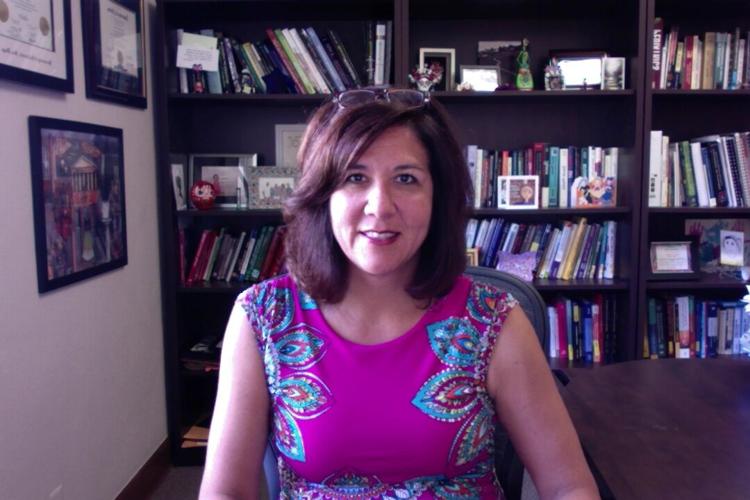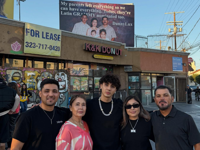
Dr. Denise Chavira has been a professor of psychology at the University of California since 2012. Photos provided by Dr. Denise Chavira
Denise Chavira, a professor of psychology at UCLA, has navigated her career and personal life intending to reduce mental health disparities and increase access to evidence-based treatments for underserved communities, including Latinos.
As we leave behind the month of July, known as Minority Mental Health Awareness Month, Chavira, believes a community’s well-being and the future of youth are closely linked to the ways they and their families are supported and guided as it pertains to mental health prosperity. As a Latina, her efforts and research have strongly focused on Latinos and other youth of color.
Chavira is the director of the Culture and Anxiety Lab for Mental Health Advances (CALMA), whose mission is to understand factors that facilitate and inhibit appropriate utilization of mental health services, as well as improve both the detection and treatment of mental health problems in Latino communities.
Chavira is a past recipient of the UCLA Diversity and Equity Inclusion Faculty Award for Community Service and Praxis and the American Psychological Association Minority Fellowship Program Dalmas Taylor Distinguished Contributions Award for research in racial and ethnic minority psychology. She has also received multiple grants from the National Institute of Mental Health to examine barriers to service use among ethnic minorities, paraprofessional models of service delivery and digital mental health interventions for rural and Latino youth with anxiety and depression.
Chavira was born in Los Angeles and raised in Montebello. She attended Catholic schools until she went to college as a first-generation college student. Her father was raised in Chavez Ravine and her mother in Northern California in a farming community. “[I’m] happy to say that I had a childhood that was grounded in traditional Latinx values such as family and community,” she said.

CALMA stands for Culture and Anxiety Lab for Mental Health Advances. Photo provided by Dr. Denise Chavira
Chavira, who has been at UCLA since 2012, has written many research books and articles about depression, anxiety, accessibility to mental health resources and family dynamics, among other topics, all with a research-based direction.
"In CALMA’s research group, we aim to develop projects that help us understand the causes of problems like anxiety and depression in Latino youth and young adults,” she told CALÓ News. “We also focus on trying to understand the barriers that get in the way of Latino youth and families being able to use mental health services.”
Mental health issues among youth have proven to be at an all-time high in the last few years. According to a new nationwide Blue Shield of California/Harris Poll survey, nearly nine out of 10 Gen Z youth, born between 1997 and 2012, say they are experiencing mental health challenges regularly.
The survey, which recorded youth responses from May 31 to June 13, 2023, also revealed a great disparity among gender and socio-economic levels. 17% of young women, 26% of transgender youth and 42% of non-binary youth rated their mental health as “poor,” compared to nine percent of young men.
In addition, lower-income youth felt more challenged, with 20% of youth in households earning less than $30,000 annually rating their mental health as “poor,” compared to seven percent of youth in households with income above $96,000.
Gen Z, as well as millennial youth and young adults, make up a large percentage of Chavira’s students and researchers at CALMA. For her, this is important, as those students are also actively conducting and moving research forward for their own families and communities. “Many of the students who work in my lab, either as undergraduates or graduate students, come from underrepresented backgrounds, largely first generation, many of which are Latinos,” she said.
At CALMA, the research team also examines how the family environment and cultural factors such as acculturative stress, immigration and conceptualizations of psychological problems influence anxiety and depression in United States and foreign-born Latino families.
“Latino families and youth receive fewer mental health services than white families [and] youth despite often reporting higher levels of anxiety and depression than their white peers,” Chavira said. “Some of the barriers to mental health services involve poverty, access to services, insurance coverage, transportation barriers, lack of time to attend appointments due to work, mental health awareness and unfavorable attitudes toward mental health.”
A 2022 American Psychological Association study revealed that children and families living in the U.S. who have experienced migration-related trauma encounter significant barriers to receiving mental health care, including mental health stigma, distrust of service and cultural and linguistic differences.
Robel Espino, an education specialist assistant and a first-generation college graduate who attended California State University, East, talked about the difficulty of dealing with depression in a Latino household. In a 2019 article, he wrote about how, as a teen, he told his mother he was dealing with depression and she accused him of being “lazy” and having “too much time to simmer” in his own thoughts, a reality and response that is all too common among Latino parents.
Chavira’s research program is also trying to understand barriers to services that college students experience and ways to educate parents about mental health successfully in order that they can be active supporters of their kid's needs.
This is one of the issues that the STAND Research Program at East Los Angeles Community College (ELAC) aims to advance. STAND, a collaboration between ELAC and UCLA, is a research program that Chavira is part of as a co-investigator.

Dr. Denise Chavira with some of her students and colleagues. Photo provided by Dr. Denise Chavira
STAND screens for symptoms of anxiety, depression and suicidal ideation among students and then matches them with the level of care that best meets their needs. STAND also seeks to identify barriers that may deter students from getting the mental health services they may need.
“We're trying to understand how to involve, or how to educate, families and parents about mental health services and how to increase awareness so that they're more supportive of their college students,” she said. “A lot of the time, what we hear is that college students may want services, but they're embarrassed by it, or they don't feel comfortable getting these services because they feel as if their family is not going to support them.”
As part of CALMA, student researchers and investigators also conduct mindfulness projects for teens ages 12 through 17, a practice that Chavira said helps with many mental health feelings.
“Mindfulness is basically practicing being more aware of yourself, your thoughts and feelings, and your surroundings without being judgmental,” Chavira said. “Practicing mindfulness involves things like catching yourself getting stuck in negative thoughts and purposely switching your focus to pay attention to other things that are happening around you, or noticing when you are tense and stressed out and focusing on your breathing to calm down.”
Graduate and postgraduate students who are part of CALMA are trained to deliver mindfulness interventions. Known as peer coaches, they often help other teenagers dealing with issues like anxiety, depression, stress, or panic attacks to be more mindful and present, which ultimately helps them calm down. “Peer coaches are closer in age to teenagers than somebody like myself and that helps kids to relate to their coaches better. We teach peer coaches how to deliver mindfulness and they meet with the teenagers every week and go over different mindfulness skills with them through Zoom.”
According to Chavira, what CALMA will soon be researching is how to teach parents to also practice mindfulness. “Teaching teens to be stronger and more resilient is important, but we're also doing some work to see what happens when you also teach the parents the same skills,“ she said. “How much more improvement can we see if parents are also better able to manage their moods and their emotions and maybe implement better discipline or create more warmth in their home environment?”
CALMA is currently accepting youth for UCLA’s mindfulness projects. For more information, please email at ymap.ucla@gmail.com.














(0) comments
Welcome to the discussion.
Log In
Keep it Clean. Please avoid obscene, vulgar, lewd, racist or sexually-oriented language.
PLEASE TURN OFF YOUR CAPS LOCK.
Don't Threaten. Threats of harming another person will not be tolerated.
Be Truthful. Don't knowingly lie about anyone or anything.
Be Nice. No racism, sexism or any sort of -ism that is degrading to another person.
Be Proactive. Use the 'Report' link on each comment to let us know of abusive posts.
Share with Us. We'd love to hear eyewitness accounts, the history behind an article.